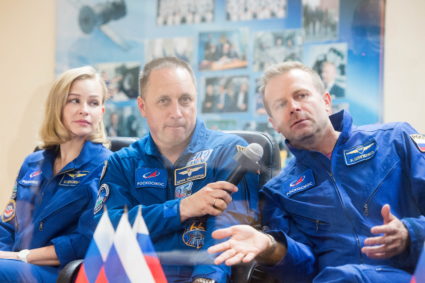
The Alvin Ailey American Dance Theater has just launched a 20-city U.S. tour under its new artistic director Alicia Graf…

MOSCOW (AP) — In a historic first, Russia is set to launch an actor and a film director into space to make a feature film in orbit — a project the nation's space chief has hailed as a chance to raise the prestige of Russia's space program.
Actor Yulia Peresild and director Klim Shipenko are set to blast off Tuesday for the International Space Station in a Russian Soyuz spacecraft together with cosmonaut Anton Shkaplerov, a veteran of three space missions. After 12 days on the space outpost, Peresild and Shipenko will return to Earth with another Russian cosmonaut.
The crew plans to film segments of a new movie titled "Challenge" about a surgeon summoned to rush to the space station to save a crew member who suffers a heart condition.
Speaking at a news conference at the Russian launch facility in Baikonur, Kazakhstan, Peresild acknowledged that the training for the mission was grueling but described it as a once-in-a-lifetime opportunity.
"It's a miracle, an incredible chance," she said.
"We worked really hard and we are really tired, even though we stay in good spirits and smile," the 37-year-old actor confided. "It was psychologically, physically and morally hard. But I think that once we achieve the goal, all that will seem not so difficult and we will remember it with a smile."
Peresild said it was difficult for her to adapt to the strict discipline and rigorous demands required during the training.
"Here on Baikonur, we made friends with everyone and all people warmed up," she said. "But it was quite difficult in the beginning, when you aren't given much choice: Just go, run, go faster, hold on, carry on. It wasn't easy for us and it was quite unexpected, but we have gone through it."
She said learning about the design and handling of the spacecraft was the most challenging part of the preparation for the flight.
"It didn't come easy for me, to be honest," she said. "For the first two weeks, I was learning it until 4 in the morning every night. There are so many acronyms, and if you don't learn them all you won't understand anything else further on."
The part of the training that Peresild liked the most was a flight imitating weightlessness, in which a plane goes into a steep dive to allow those inside about 20 seconds in zero gravity. She added that she realizes that zero gravity in orbit could be completely different and is gearing up for her first morning in orbit.
"Some mornings could be difficult, even on Earth," she said. "We thought a lot about it, and cosmonauts shared some life hacks."
Shipenko, 38, has made several commercially successful movies, including "Kholop" ("Serf"), a 2019 movie that set a Russian box office record. He also described the training as tough.
"Of course, we couldn't make many things at the first try, and sometimes even at a third attempt, but it's normal," he said.
One of Shipenko's previous films, "Salyut-7," told the real story of a challenging 1985 mission of two Soviet cosmonauts sent to resuscitate an abandoned space station.
He described the four-month training course as very intensive, adding that while it didn't turn him and Peresild into professional astronauts it made them well prepared for the mission.
Shipenko said he's thrilled to be the first filmmaker in space and is keen to experiment with lighting, camera settings and other technical aspects. Once on the space station, Shipenko said he will don a T-shirt that he always wears when he begins to shoot a new movie.
Shkaplerov insisted that his entertainment-world crewmates are fully ready for the flight after their fast-track training.
"No one had that experience before: to prepare people who had no relation whatsoever to the space program for a space flight," he said, adding that it could be useful in the future if a need arises to urgently send an outside expert into orbit.
Dmitry Rogozin, head of the Russian state space corporation Roscosmos, was a key driving force behind the project. Rogozin described making the world's first feature film in space as a chance to raise the nation's space prestige.
"Movies long have become a powerful instrument of propaganda," he said in June, arguing that the new film would help counter what he described as Western efforts to "humiliate" the Russian space program.
Some Russian media were skeptical about the plan and there were reportedly some doubts inside the Russian space program as well.
Sergei Krikalev, a highly decorated veteran of the Soviet and Russian space programs who made six space flights, was fired from his post as director of Roscosmos' crewed missions in June following what some Russian media described as his sharp criticism of the filmmaking project.
Krikalev was reinstated to the director's job just a few days later, apparently due to intervention by his highly-placed backers. He has refrained from public comments on the project.
The Russian segment of the International Space Station is considerably less spacious compared to the U.S. segment, leaving little room for filmmaking. It was expanded in July after the long-awaited arrival of the new lab module, the Nauka, which is yet to be fully integrated into the station.
Once they arrive at the space station on Tuesday, the three newcomers will join Thomas Pesquet of the European Space Agency; NASA astronauts Mark Vande Hei, Shane Kimbrough and Megan McArthur; Aki Hoshide of the Japan Aerospace Exploration Agency; and Roscosmos cosmonauts Oleg Novitskiy and Pyotr Dubrov.
Filmmaking plans are sketchy, but Shipenko said that Shkaplerov, Novitskiy and Dubrov will all play parts in a new movie. Novitskiy, who is set to star as the ailing cosmonaut in the film, will take the captain's seat in a Soyuz capsule to take the crew back to Earth on Oct. 17.
Sustain our coverage of culture, arts and literature.